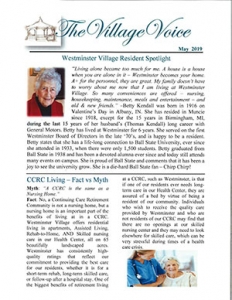Chaplain’s Corner: CXXXVI
“Resting in God”
As I walk around Westminster Village on a daily basis I observe residents sitting, sometimes reading, doing exercise but I wonder how many of you are practicing the presence of God. Are you taking time to meditate, pray or just be in the presence of God? The Sabbath is a day of rest when we take time to focus on our relationship with God in worship and praise. But we need to find those timeless moments in each day to allow our souls to be at peace.
A woman gazes out her window, savoring a cup of coffee. A couple yawn and stretch on silk sheets, welcoming the rising sun. Friends walk together slowly through the woods. A teenager strums a guitar at the end of a pier enshrouded by mists rising from a lake. If only we could enjoy such contentment.
There is wonderful news! Such restfulness is just a transaction away. All you need is to try Maxwell House coffee. Or invest your nest egg with Fidelity. Or rent a cottage in the woods through Airbnb. Then you too will be able to find contentment. Here’s the irony. Restfulness can actually be yours right now, in the life you already have. And it’s free.
All you need to do is to receive a gift that God has always been willing to give. It’s connected to the deep wisdom of keeping a Sabbath-setting aside time in each day to make a break with your routine and the culture in which we live, move and have our being. The Hebrew word SHABBAT means stop, quit, cut it out. It’s part of the design of creation. It’s not a request or recommendation. It’s a command we find in Genesis. And it’s quite possibly the single most challenging divine directive for Americans in the 21st century.
That’s because activity makes us feel useful. And important. And maybe, from time to time, we even have moments when it seems as if we’re actually in control. There are things to be done: answering a dozen emails, breakfast, lunch and dinner and doctor’s appointments. But none of these activities- in fact no task in our life rivals the importance of placing ourselves in God’s presence. And then simply staying there.
The unidentified author of the New Testament book of Hebrews acknowledges that entering God’s “Sabbath rest”-resting from our strenuous efforts to make it through life under our own steam-is a major challenge. “Let us, therefore, make every effort to enter that rest.” (Hebrews 4:11)
When you think about it, that’s a wonderful turn of phrase. It takes effort to enter God’s rest. It takes planning and resolve to keep the Sabbath in a culture that is allergic to slowing down.
Author, Dan Allendar, adds that Sabbath comes down to replacing daily frenzy with the kinds of things that fill our souls with joy. There’s no consensus amongst followers of Jesus as to how we are to keep the Sabbath or even if there’s a particular day of the week-Saturday? Sunday? –that should be targeted. If you’re just beginning to consider a Sabbath experience, you might choose to carve out half a day. Or designate a block of a couple of hours in which you unplug yourself from the world.
What we really need is to just set aside the time in each week to enjoy what God has actually given to us.
Faithfully,
Ron Naylor











